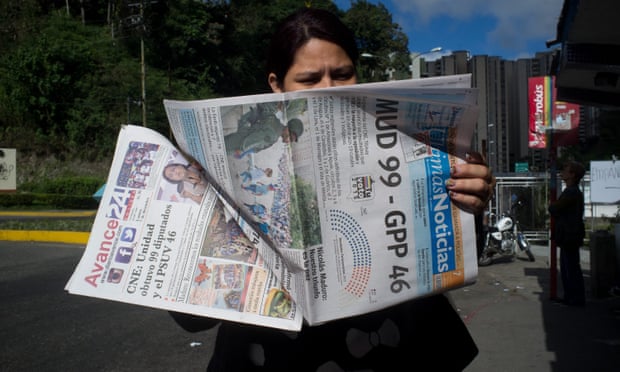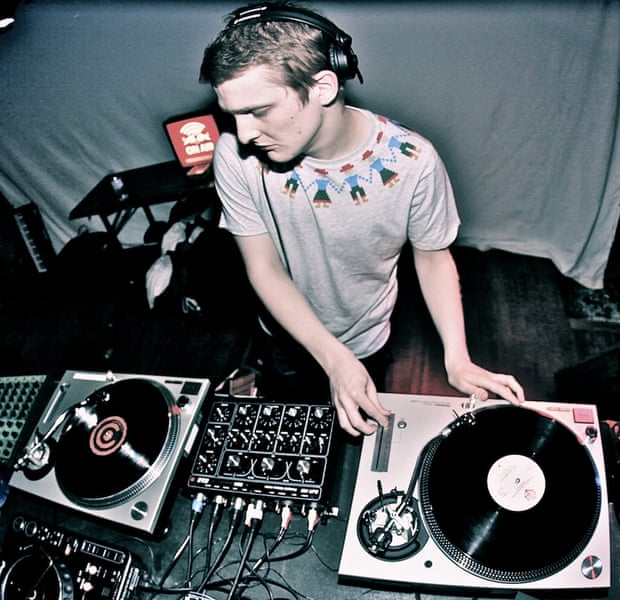
Venezuela awoke to a new political landscape on Monday, after the country’s opposition won an overwhelming victory in parliamentary elections in the oil-rich nation struggling with a severe economic crisis and rampant violent crime.
Candidates for the opposition seized a majority in the national assembly, marking a major shift in the polarized country, which set out on a leftist path in 1999 under the late president Hugo Chávez and his project to make Venezuela a model of what he called “21stcentury socialism”.
Fireworks burst in the sky above Caracas as election officials announced partial results of the vote, indicating the opposition coalition Democratic Unity Roundtable (MUD) had broken the dominion that the ruling United Socialist Party of Venezuela (PSUV) has held on the legislature for 16 years.
In the opposition stronghold of Altamira, cars honked their horns in celebration throughout the night.
“Venezuela wanted a change and today that change has begun,” said Jesús Torrealba, leader of the MUD coalition.
The opposition coalition won at least 99 seats in the 167-seat unicameral national assembly, electoral authorities announced early on Monday. The ruling socialist party took 46 seats.
If the opposition take 13 of the 22 remaining races, it would secure a two-thirds supermajority, allowing it to pass major legislation, sack supreme court justices or even convene a convention to rewrite Chávez’s 1999 constitution.
Torrealba repeated a promise to use the opposition’s new-found strength to work on an amnesty for political prisoners, promising to return the rights of “those who have been unjustly persecuted, jailed, blocked from politics or exiled”.
Venezuela’s best-known jailed politician is Leopoldo López, sentenced to nearly 14 years on charges of promoting political violence in 2014 that killed 43 people. But the opposition has a list of what it says are more than 70 other political prisoners.
President Nicolás Maduro recognized the “adverse results” but said the outcome of the election was not the end to the “Bolivarian revolution” he inherited from Chávez who died in 2013 from cancer.
“We have lost a battle today but now is when the fight for socialism begins,” he said in a late-night address.
Five hours after polls closed, election officials announced partial results, giving the MUD 99 seats and the PSUV 44 seats. The winners of 22 additional seats had yet to be determined.
The vote was seen as a referendum on Maduro’s handling of the country, which despite having the world’s largest oil reserves, faces chronic shortages of basic foods, inflation in the triple digits and a wave of violent crime.
The government says much of the country’s woes are the result of an “economic war” being waged against the government by the opposition and the United States, exacerbated by the shrinking price of oil, Venezuela’s lifeblood.
“The economic war has won, for now, circumstantially,” Maduro said, predicting that the opposition would try to dismantle the gains of the “Bolivarian revolution”, which while oil prices were high established a broad social welfare system that won Chávez a fervent following.
Maduro’s term ends in 2019, but hardliners among the opposition want to force him out next year through a recall referendum.
“I can’t see this government finishing its term because it is too weak,” said opposition leader Henry Ramos. “Internal frictions are beginning. They’re blaming each other for this huge defeat.”
In the working-class 23 de Enero neighbourhood Carlos Ortega, a retired construction worker and long time chavista, worried about an opposition win.
“Things are going to get worse for us,” he said across the street from the school where he had just voted for the chavista candidate of his district.
“My pension is going to disappear,” he said. “And I can forget about getting assigned a house through the ‘housing mission’,” said Ortega, referring to a current government program to grant social housing to the poor.
“With an opposition win, all that is over,” he said.
But Alexandra Barreto, a 32-year-old systems engineer, hopes that with the opposition controlling the assembly, changes will be positive.
“Today if you aren’t killed by street crime, you die of hunger or from something as simple as dengue,” she said while standing in a long line in the eastern Caracas district of Petare, waiting to cast her vote. “There is no security, basic subsidized foods are scarce and essential medicines are hard to come by.”
“What had to happen, happened,” said Rosa Gutiérrez, a housekeeper, of the opposition victory. “The road ahead won’t be easier but we have to start somewhere,” she said.
The opposition victory was the latest in a string of setbacks for incumbent Latin American populist leaders, including Argentina’s Cristina Fernández de Kirchner, whose hand-picked candidate Daniel Scioli was defeated last month by the centre-right Mauricio Macri. Latin America’s left gained power in the wake of Chávez’s ascent but more recently has been struggling in the face of a region-wide economic slowdown and voter fatigu


 Like his favourite spiritual jazz records, Elaenia is improvisational
and designed to be heard in one go. But Shepherd says he “finds it
difficult to reconcile not being religious with being into spiritual
music”. Instead, he admires the genre architecturally. “Spiritual jazz,
for me, feels like building a space out of nothing and within that space
[the musicians] build their house, their city, their entire universe
through music,” he says excitedly. “They exist in this black hole and
they All
of which, to be honest, is starting to sound a bit rollneck jumper. But
Shepherd winces at the idea of anyone using the word “jazzy” to
describe his music, as if it could be found on the kind of compilation
that would’ve played in a hotel lobby in 1998. “It’s very sad to be
misunderstood. You can press play and have prejudices about what jazz is
or isn’t, but I like to imagine I make music that doesn’t require the
listener to have any prior knowledge or reference points.” After all, he
adds, “what kind of boring music is that?” Elaenia is anything but boring; even in its chaos, it is beautiful.
It builds like a hypnotic DJ set – a soothing balm after a hard day in
the office; a respite from a packed train full of screaming children
where you can’t sit down. Some people are angry Shepherd hasn’t made
Floating Points: The Bangerz album, he says, but he hopes they will find
Elaenia “inviting in some way” in spite of that. “I would like to feel
that a person walks into an empty room and that, through listening to
the record, the room is built for them without trying to push them out
at any point,” he explains. “I’m trying to draw people in.” You don’t need a thesis to enter Sam Shepherd’s lab – an open mind will do.
Like his favourite spiritual jazz records, Elaenia is improvisational
and designed to be heard in one go. But Shepherd says he “finds it
difficult to reconcile not being religious with being into spiritual
music”. Instead, he admires the genre architecturally. “Spiritual jazz,
for me, feels like building a space out of nothing and within that space
[the musicians] build their house, their city, their entire universe
through music,” he says excitedly. “They exist in this black hole and
they All
of which, to be honest, is starting to sound a bit rollneck jumper. But
Shepherd winces at the idea of anyone using the word “jazzy” to
describe his music, as if it could be found on the kind of compilation
that would’ve played in a hotel lobby in 1998. “It’s very sad to be
misunderstood. You can press play and have prejudices about what jazz is
or isn’t, but I like to imagine I make music that doesn’t require the
listener to have any prior knowledge or reference points.” After all, he
adds, “what kind of boring music is that?” Elaenia is anything but boring; even in its chaos, it is beautiful.
It builds like a hypnotic DJ set – a soothing balm after a hard day in
the office; a respite from a packed train full of screaming children
where you can’t sit down. Some people are angry Shepherd hasn’t made
Floating Points: The Bangerz album, he says, but he hopes they will find
Elaenia “inviting in some way” in spite of that. “I would like to feel
that a person walks into an empty room and that, through listening to
the record, the room is built for them without trying to push them out
at any point,” he explains. “I’m trying to draw people in.” You don’t need a thesis to enter Sam Shepherd’s lab – an open mind will do.


